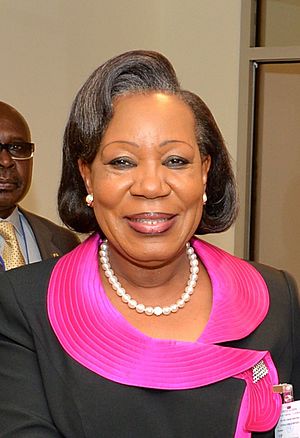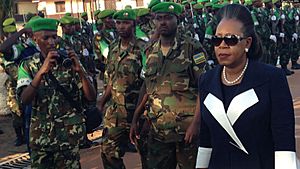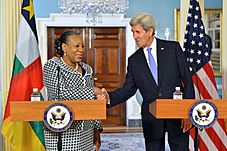Catherine Samba-Panza facts for kids
Quick facts for kids
Catherine Samba-Panza
|
|
|---|---|

Samba-Panza in 2014
|
|
| Transitional President of the Central African Republic | |
| In office 23 January 2014 – 30 March 2016 |
|
| Prime Minister | André Nzapayeké Mahamat Kamoun |
| Preceded by | Alexandre-Ferdinand Nguendet (Acting) |
| Succeeded by | Faustin-Archange Touadéra |
| Mayor of Bangui | |
| In office 14 June 2013 – 23 January 2014 |
|
| Preceded by | Nazaire Yalanga Nganaféï |
| Succeeded by | Hyacinthe Wodobodé |
| Personal details | |
| Born |
Catherine Souga
26 June 1954 Fort Lamy, French Equatorial Africa (present-day N'Djamena, Chad) |
| Political party | Independent |
| Spouses |
Jean-Claude Sappot
(divorced)Cyriaque Samba-Panza
(m. 1998) |
| Children | Stéphane Christelle Jimmy |
| Alma mater | Panthéon-Assas University |
| Signature |  |
Catherine Samba-Panza (born Catherine Souga on June 26, 1954) is a politician from the Central African Republic. She served as the country's transitional president from 2014 to 2016. This made her the first woman to ever be head of state in the Central African Republic. Before becoming president, she was the Mayor of Bangui, the nation's capital city, from 2013 to 2014.
Samba-Panza started her career in the insurance business and also worked as a strong supporter of women's rights. In 2013, she became the mayor of Bangui after the city was badly damaged by the Central African Republic Civil War. A year later, she was chosen to be the transitional president. Her main job was to bring peace back to the country by disarming fighting groups. She also focused on helping the economy recover with jobs and aid from other countries.
Contents
Early Life and Education
Catherine Souga was born on June 26, 1954, in Fort Lamy, which is now the city of N'Djamena in Chad. Her mother was from the Central African Republic (CAR), and her father was an accountant from Cameroon. When she was a teenager, her family moved to Bangui, the capital of the CAR.
In Bangui, she finished high school and began studying business law. She later moved to Paris, France, to continue her studies. She earned a special degree in insurance law from Panthéon-Assas University. After graduating, she worked for an insurance company in Paris.
Career Before Politics
In 1984, Samba-Panza moved back to Bangui and worked for a state-owned insurance company. Later, she worked for a branch of the major insurance company Allianz. She also started her own insurance advice company.
While working, she also became very involved in helping her community. She joined groups that worked to protect women's rights. She fought for more women to be in government and for better support for women who were treated unfairly. Samba-Panza believed it was important for women to know their rights so they could defend themselves.
In 2003, she took her first political role. She was asked to be the vice president of a national meeting to help bring peace and unity to the country.
Mayor of Bangui
In May 2013, Catherine Samba-Panza was appointed mayor of Bangui. She took office during a very difficult time. The Central African Republic Civil War had left the city in ruins. There was no money, and much of the city's buildings and services were destroyed.
As mayor, her main goal was to rebuild the city. She worked to raise money through taxes and by asking for help from other countries. Because she was seen as neutral and fair by the different fighting groups, both Christians and Muslims accepted her as mayor. Her hard work earned her the nickname "the courageous mayor."
Transitional President

The conflict in the Central African Republic became worse, and the president at the time stepped down. In January 2014, Catherine Samba-Panza was chosen to be the new interim, or transitional, president. A transitional president is a temporary leader who governs until a permanent one can be elected.
She was chosen because she was not connected to either of the main fighting groups, the Séléka and the Anti-balaka. After being elected by a special council, she said:
"I call on my children, especially the anti-balaka, to put down their arms and stop all the fighting. The same goes for the ex-Séléka – they should not have fear. I don't want to hear any more talk of murders and killings. Starting today, I am the president of all Central Africans, without exclusion."
Leading a Divided Country

Samba-Panza became president during a time of great violence and chaos. Her main goals were to restore safety and create jobs. She believed that poverty and poor leadership were the main causes of the conflict.
As the first female president of her country, she was seen as a symbol of hope. Many people called her "Mother Courage," hoping a mother figure could help bring peace. She embraced this role, believing it would be more effective in uniting the people.
Her government had very little money and had to rely on help from other countries. She supported the French military's mission to help restore order. To show fairness, she appointed a Christian prime minister, André Nzapayeké, and later replaced him with a Muslim prime minister, Mahamat Kamoun.
In June 2015, she approved the creation of a Special Criminal Court to investigate serious crimes committed in the country since 2003. However, bringing peace was very difficult, and violence continued. Her time as president ended on March 30, 2016, when a new president, Faustin-Archange Touadéra, was elected and sworn in.
Life After the Presidency
After leaving office, Catherine Samba-Panza stayed in Bangui. She continued to be involved in politics as an advisor, helping with peace efforts. She also worked as an election observer for the Carter Center, watching over elections in other African countries to make sure they were fair.
In 2020, she decided to run for president again in the general election. She was the only woman in the race. She campaigned on bringing security and economic growth to the country. However, she was not successful in her campaign.
See also
 In Spanish: Catherine Samba-Panza para niños
In Spanish: Catherine Samba-Panza para niños
- First women lawyers around the world
- List of the first women holders of political offices in Africa
- List of heads of state of the Central African Republic
 | Emma Amos |
 | Edward Mitchell Bannister |
 | Larry D. Alexander |
 | Ernie Barnes |


